Abacus Data Poll: Conservatives lead by 21 as the budget fails to change opinions
May 2, 2024
From April 25 to 29, 2024 Abacus Data conducted a national survey of 1,500 adults exploring several topics related to Canadian politics and current events as part of our regular national omnibus surveys.
In this edition of our Canadian politics tracking, we report on our usual metrics along with a deep dive to assess what, if any, impact the federal budget had on political opinions.
This survey was conducted entirely after the federal budget was released on Tuesday April 16 and is different from other polls in that it measures impact a week or more after Canadians had time to be exposed to and assess the budget.
The key takeaways from this survey are:
1- There has been no movement in the polls in favour of the Liberals over a week after the federal budget was announced.
2- Younger Canadians familiar with the budget are more likely to say their impression of the government improved as a result of the budget, but this has yet to materialize in any real change in vote intention or impressions of the Prime Minister or the federal government.
3- The Conservatives now have the largest lead we have ever measured for them at 21% and lead in every region of the country (except for Quebec where they are tied for second with the Liberals) and across all demographic groups.
4- The two things most remembered about the budget was its focus on housing and the proposed changes to the capital gain tax.
Vote Intention: Conservatives lead by 20 over the Liberals
If an election were held today, 44% of committed voters would vote Conservatives with the Liberals at 23%, the NDP at 17% and the Greens at 4%. The BQ is at 33% in Quebec.
There has been no significant change in any of the party vote shares since our latest survey, but at 21-points, this Conservative lead represents the largest we have ever measured for the party.

Regionally, the Conservatives are well ahead in the Prairies, lead by 19 in BC and 19 in Ontario. In Atlantic Canada, the Conservatives are 21-points ahead of the Liberals while in Quebec, the BQ is slightly ahead with the Conservatives and Liberals tied for second at 28%.
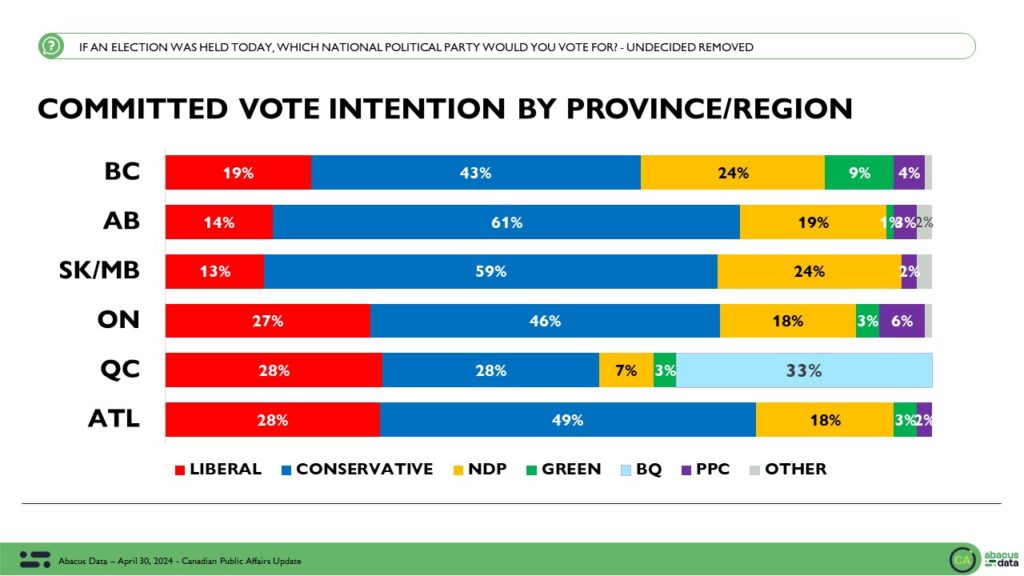
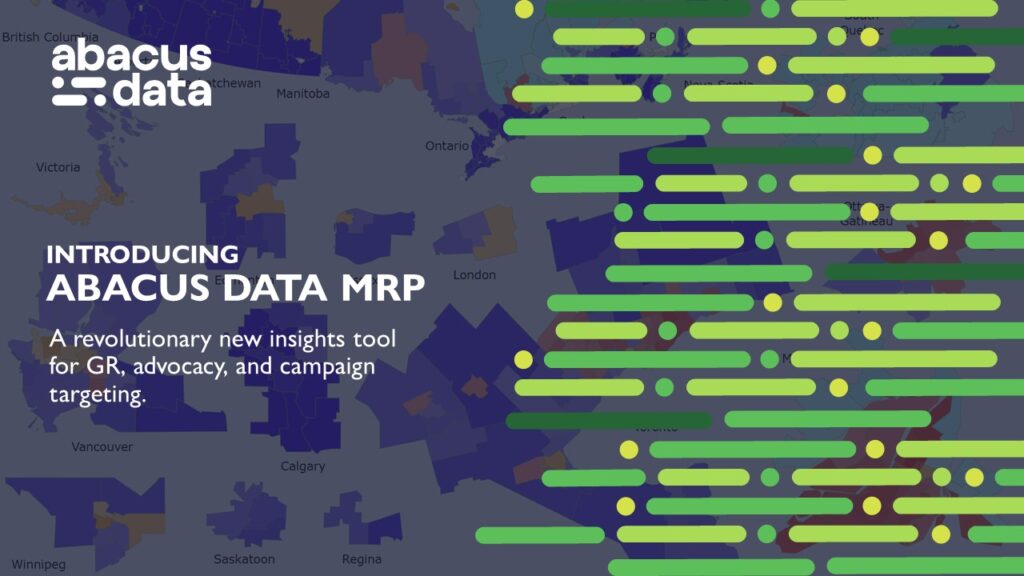
Demographically, the Conservatives lead among all age groups still. For the Liberals, there has been no real change in vote across any age group, specifically among younger Canadians – a key audience for the recent pre-budget announcements. More on this below.
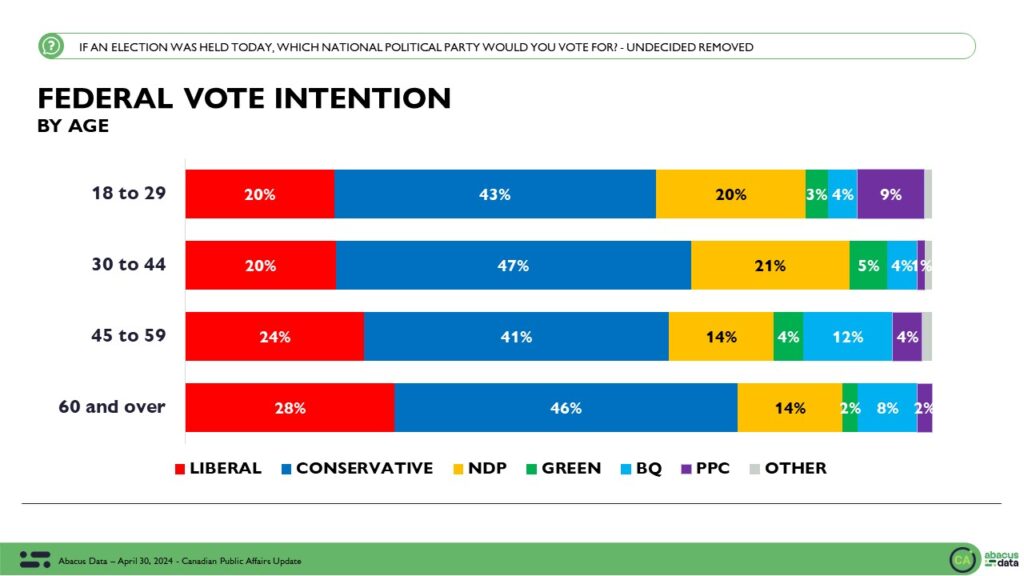
Although there has been no change in voting intentions, we do see a big shift in the accessible voter pool for the Liberals. When we ask people if they would consider voting for each of the main political parties, 53% say they are open to voting Conservative (unchanged from last week) and 37% are open to voting Liberal (down 4 from two weeks ago) while 40% are open to voting for the NDP. The NDP now has a larger accessible voter pool than the Liberals.


No major shifts in other metrics.
Beyond vote intention, the budget and events since have not had any impact on other perceptions and impressions related to Canadian politics.
There has been no shift in perceptions about the direction of the country. The federal government’s approval rating has become slightly worse. And there’s been no shift in those who feel it’s time for a change in government although those who want change and don’t think there’s a good alternative is down to 29%, the lowest we’ve measured it. This suggest more polarization on the change vs. re-elect opinion.
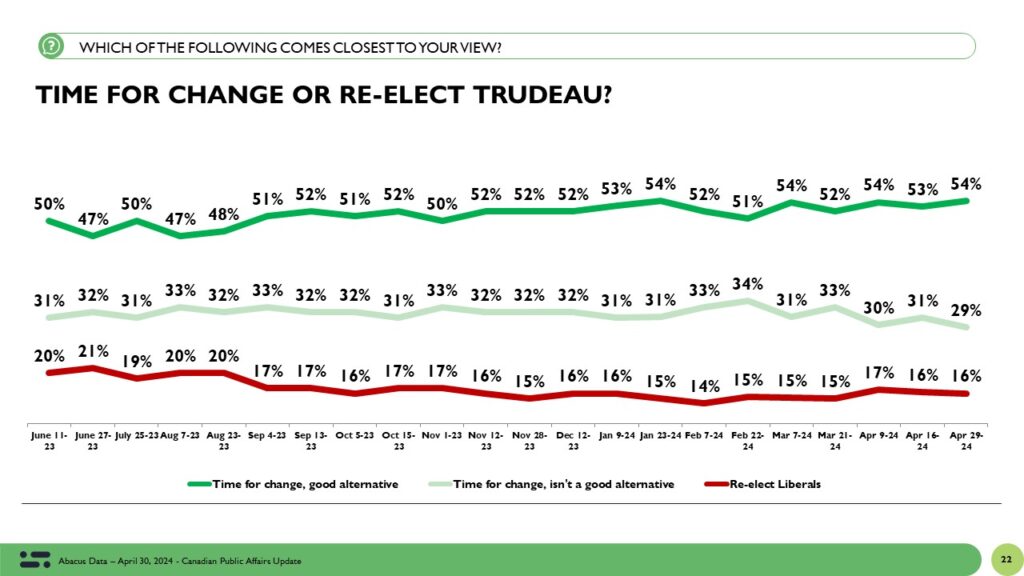
Impressions of Justin Trudeau are static. 58% have a negative impression of the Prime Minister and 24% have a positive view for a net score of -34.
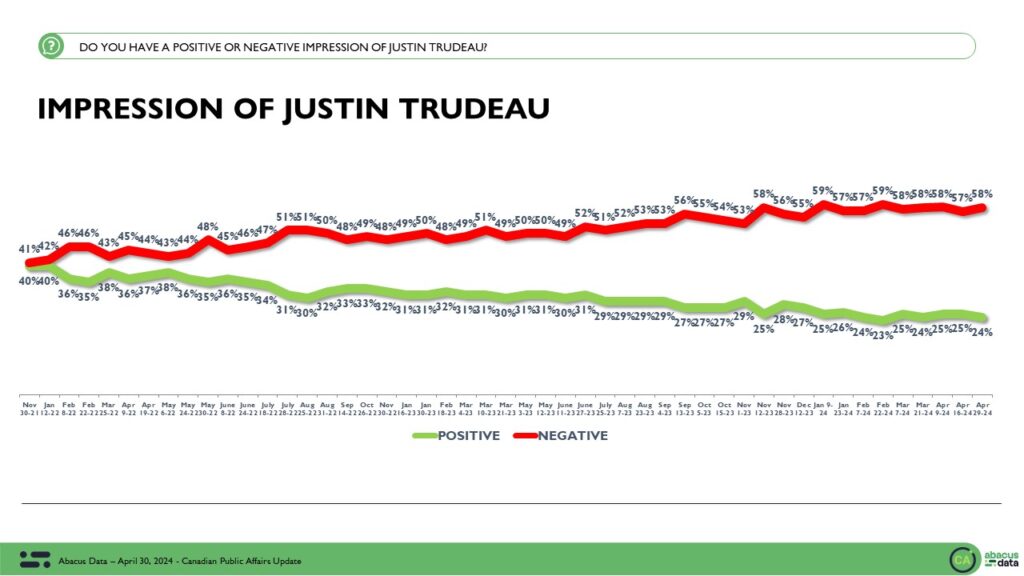
In contrast, impressions of Pierre Poilievre has seen a slight improvement in his image with 40% viewing him positively and 34% negative for a net score of +6.
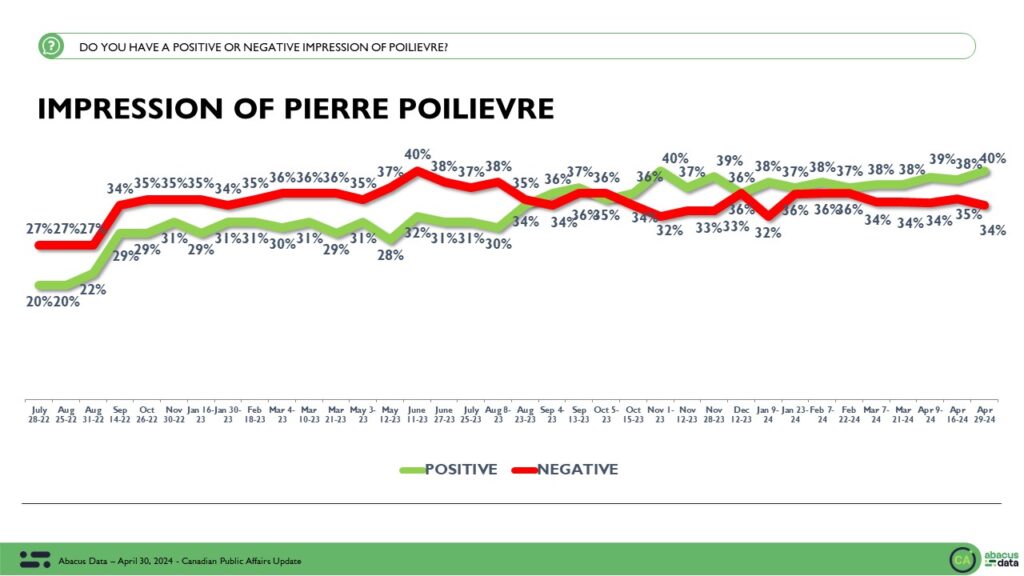
Feelings about NDP Leader Jagmeet Singh have worsened slightly since the last survey. Today 31% have a negative impression compared with 35% who have a positive one for a net score of -4.
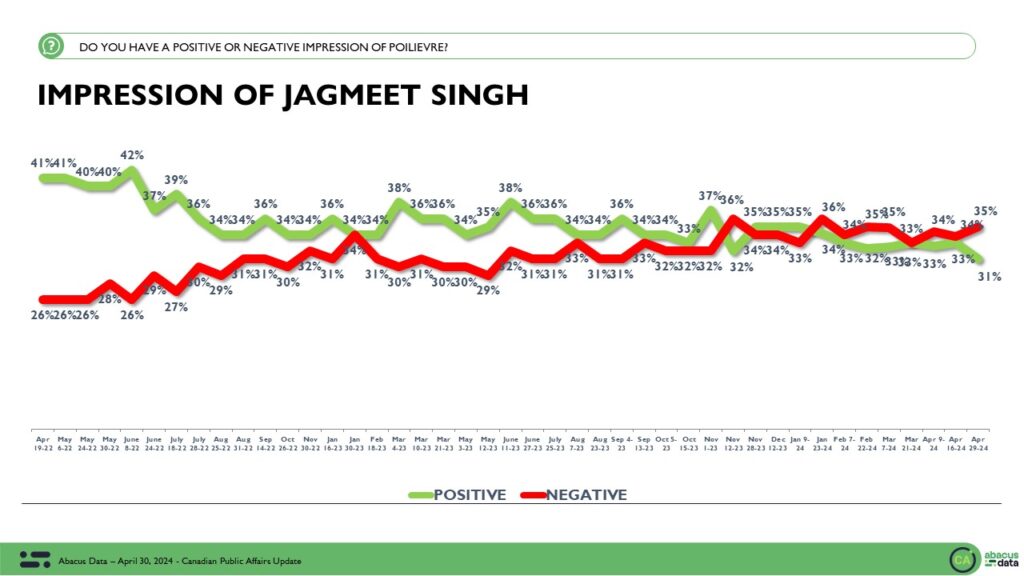
We also ask people whether their impression of each leader is getting better or worse over the past few weeks. Given the budget announcements were happening while this poll was in field, this is a good measure to capture whether any positive momentum was being generated by the announcements.
Overall, nothing has really changed from our last survey suggest the budget has had no impact on anything.
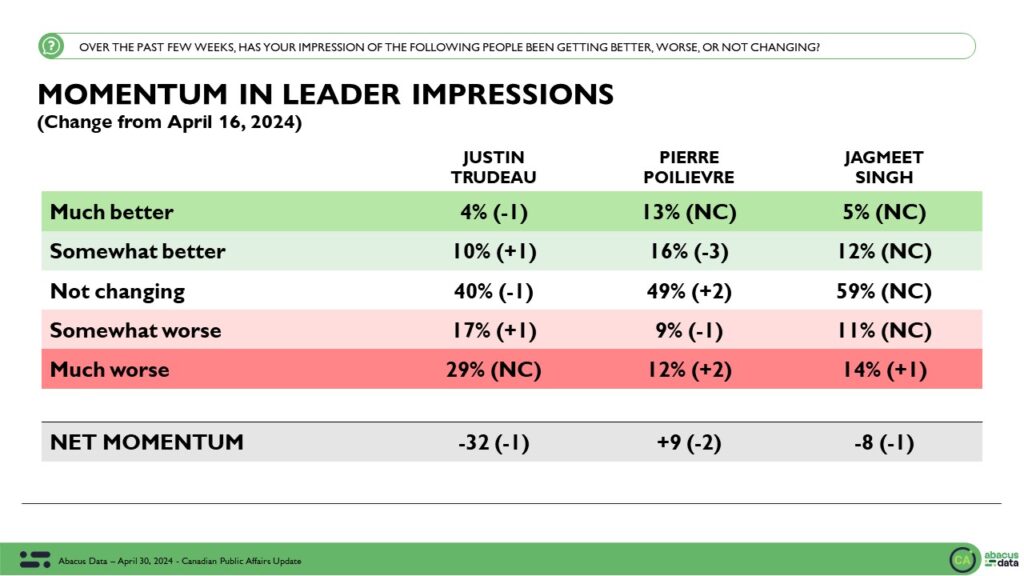
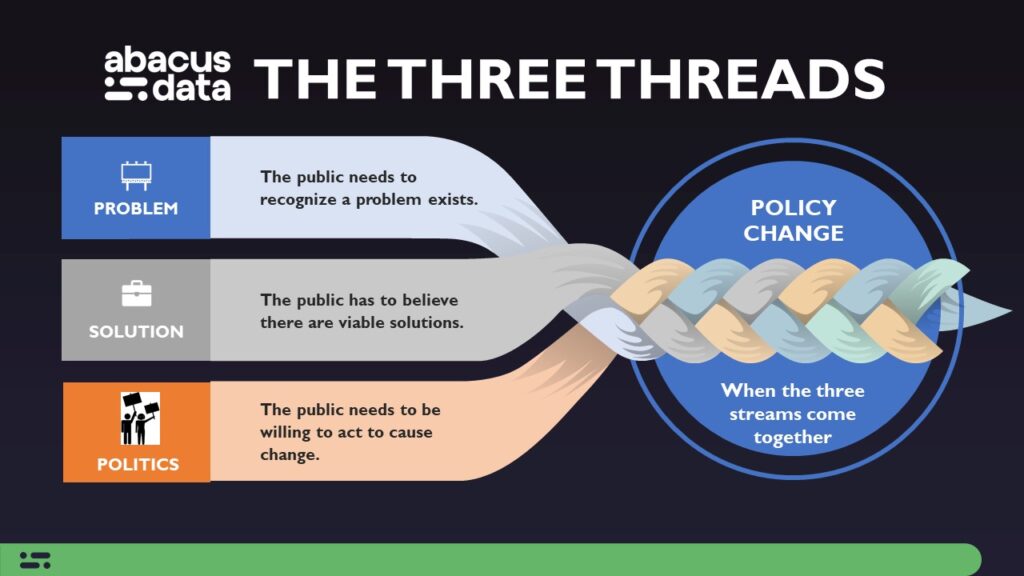
at polling for public affairs and advocacy.
Best Prime Minister and Expected Winner
For the first time in our tracking, we asked Canadians who they would prefer to be Prime Minister. Pierre Poilievre leads Justin Trudeau by 20-points and leads in every region or province in the country, including in Quebec.
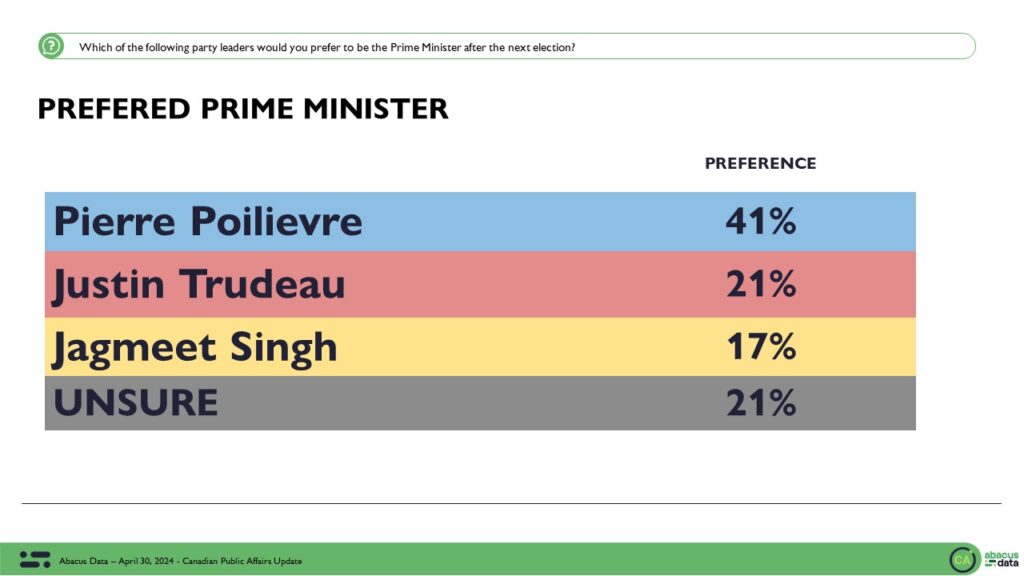
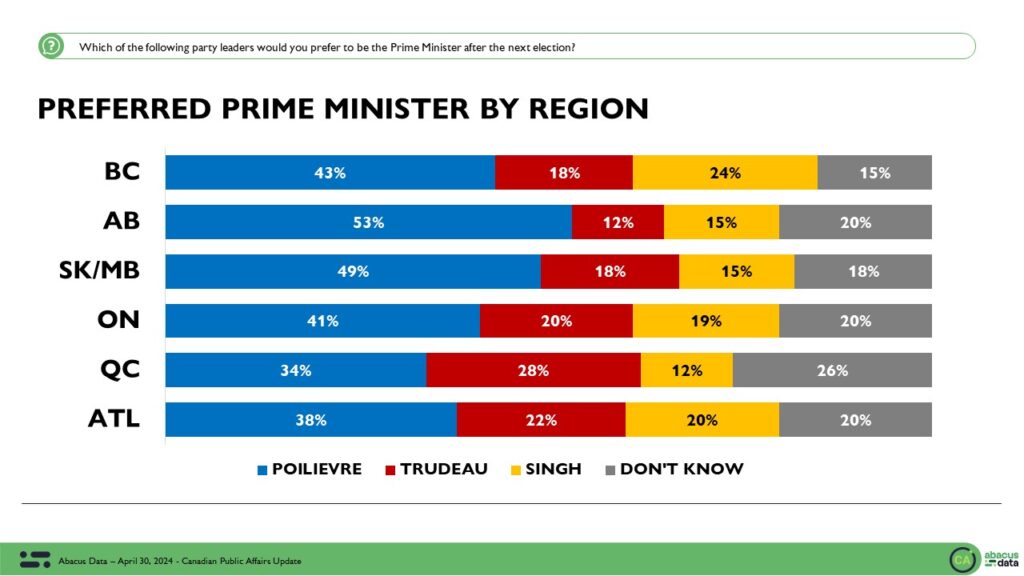
Almost half of Canadians continue to expect the Conservatives to win the next federal election. Those thinking the Liberals will win is down 3 from March.

Top Issues and the Party Best Able to Handle Them
The issue landscape is very much what it was earlier this year. The cost of living, housing, and healthcare at the top issues followed by the economy, immigration, and climate change and the environment. There has been no notable shift in issue salience since February.
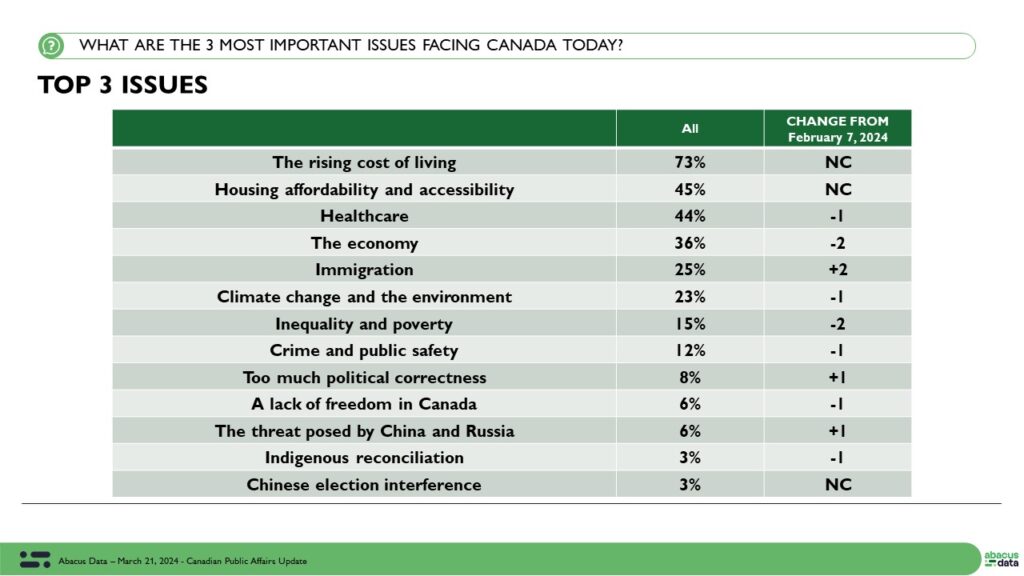
When we ask those who selected an issue as a priority which party they think is best able to handle that issue, we find the Conservatives well ahead on the cost of living, housing, the economy, and immigration. The NDP is ahead on inequality and poverty, while the Liberals lead on climate and the environment. The three parties are tied on healthcare.
Since February, the Liberals have seen modest improvements on healthcare, housing, and inequality but the Conservatives have gained as much or more on the same issues. The NDP has seen drops in all of the issues.
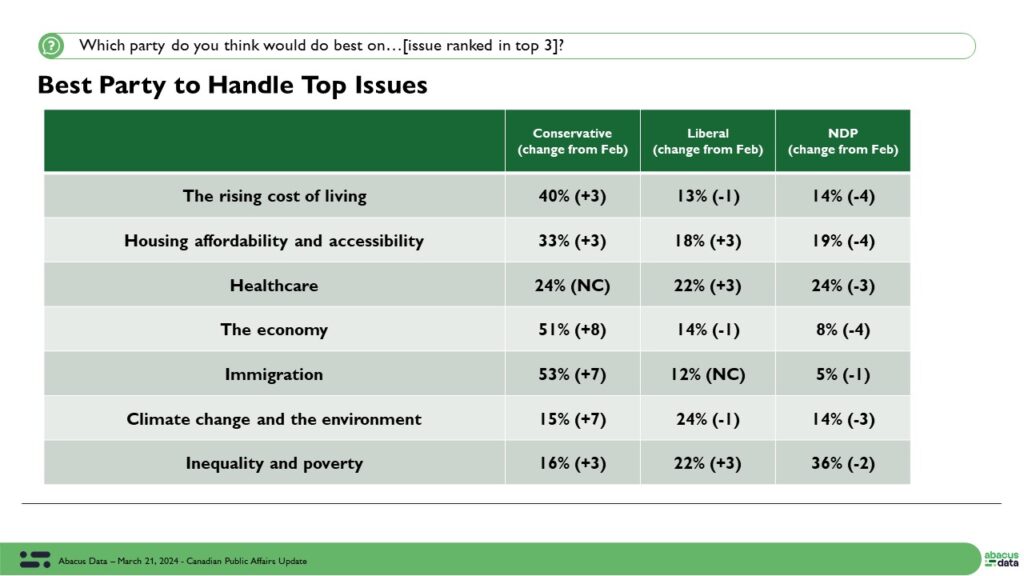
Deep Dive on the Federal Budget
4 in 5 Canadians said they heard something about the budget with about 4 in 10 saying they are at least somewhat familiar with it. Younger Canadians, of note, report being more familiar but also more likely to have heard nothing about it.
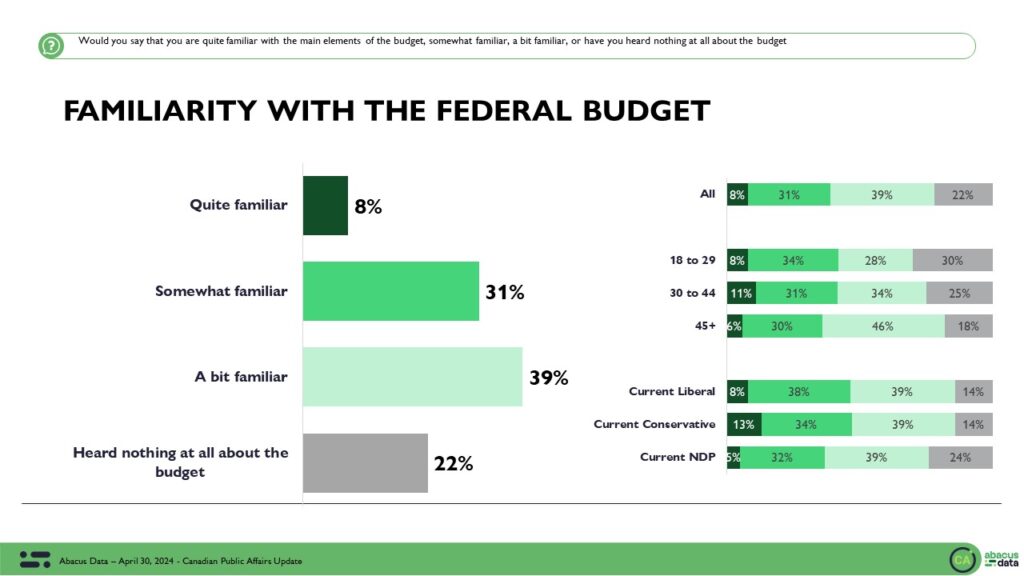
In an open-ended question, we asked those familiar with the budget to share one thing they remember about it. Housing and the capital gains tax were the two most cited items, by far. This budget was very much defined by efforts to improve housing and the change to the capital gains tax.
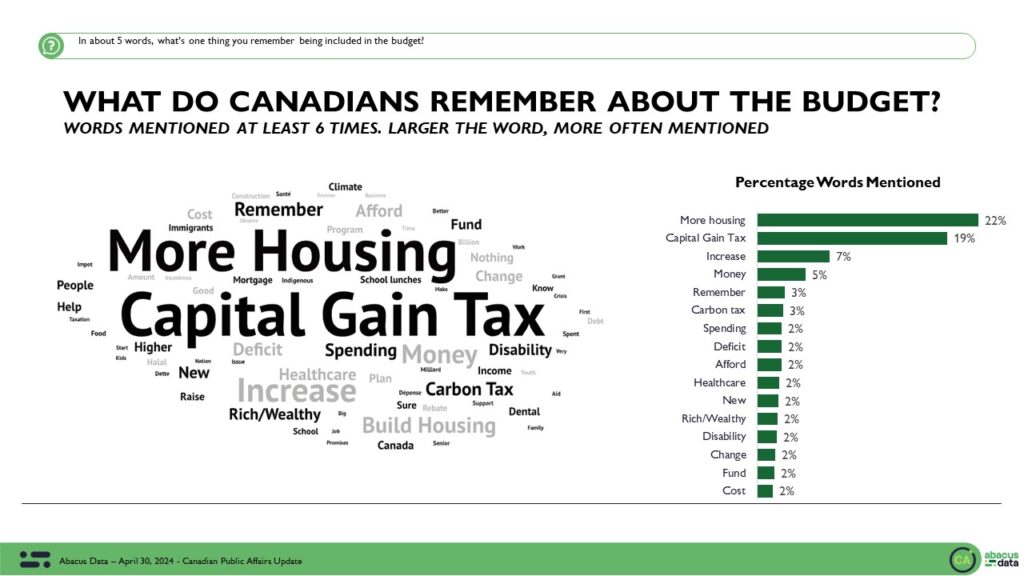
When we ask people whether the budget would have a positive or negative impact on several areas, the general perception was negative. Only about 1 in 5 Canadians thought the budget would have a positive impact on economic growth and housing while half or more those it would have a negative impact on the cost of living, taxes they pay, or government debt.

The results are slightly more positive among Canadians aged 18 to 44 who were familiar with the budget.
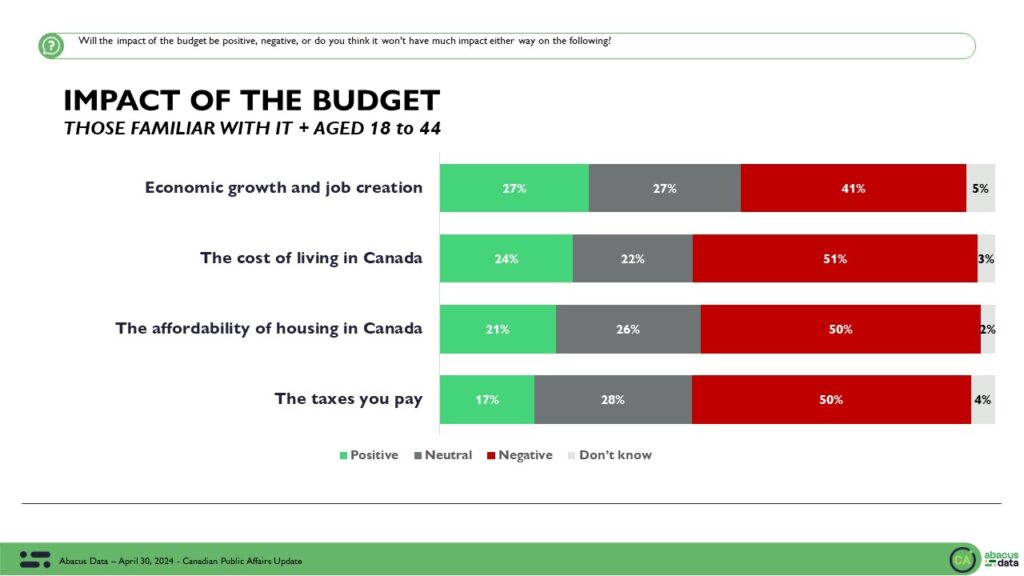
Finally, when we ask Canadians where the budget leaves them with a more positive or more negative impression of the government overall, 25% report more positive feelings, 54% report more negative ones, while 20% say the budget had no impact on their views.
Of note, younger Canadians familiar with the budget were far more likely to say it left them feeling good about the budget than older Canadians. But this view was not overwhelmingly positive.
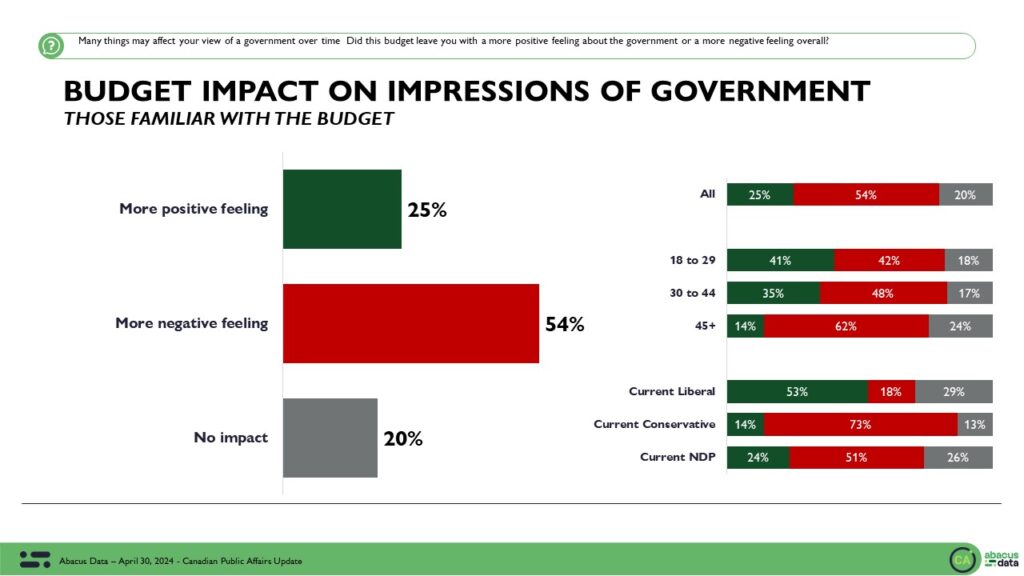
KEY INSIGHT:
Among Canadians aged 18 to 44 who were familiar with the budget and said it made them feel better about the government overall, 50% would vote Liberal today, 25% Conservative, and 14% NDP. 6% are undecided. This is some evidence that if more younger Canadians become familiar with the budget, it could increase support for the Liberals. But the impact is quite small since more still say the budget has made their view of the government worse
One way we can better assess the impact of this budget is to compare these results with a similar survey we conducted back in 2021 following that year’s federal budget.
What’s clear from the comparison is that more Canadians are familiar with Budget 2024 than they were in 2021 but the react is far more negative. This is almost entirely because of how people feel about the government overall today. In April 2021, 41% of Canadians approved of the federal government’s job performance and Justin Trudeau’s net favourable rating was -5. Today, the comparable measures are 25% and -34.

When we isolate Canadians aged 18 to 44, the results are very similar. Familiar with the budget is somewhat higher today than in 2021 – remember the 2021 budget was all about childcare so younger audiences were the target then too.
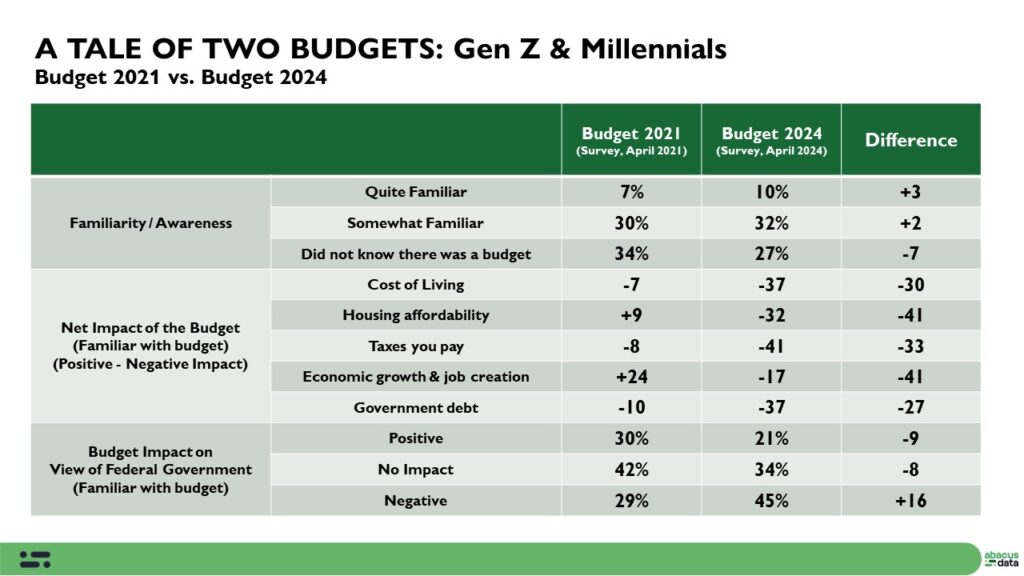
One final comparison to assess the effect of the budget and the weeks of pre-budget announcements. Remember, Trudeau started announcing measures on Easter Monday, more than two weeks before the budget was formally announced.
In the table below, I report results of four key metrics – Liberal vote share, Liberal accessible voter pool size, federal government net approval, and Trudeau’s net impression score.
Compared with March 20, the last survey we did before the budget announcements started, the Liberal vote share overall is unchanged and is unchanged among Gen Z and Millennials. The Liberal voter pool is 4-points smaller overall and 6-points smaller among Gen Z and Millennials. The government’s net approval rating is slightly worse off and Justin Trudeau’s net impression is unchanged overall and down slightly among Gen Z and Millennials.
Based on this – with almost two weeks to digest the budget – there has been no improvement in how Canadians feel about the government or the Prime Minister and the Liberals remain 21-points back of the Liberals.
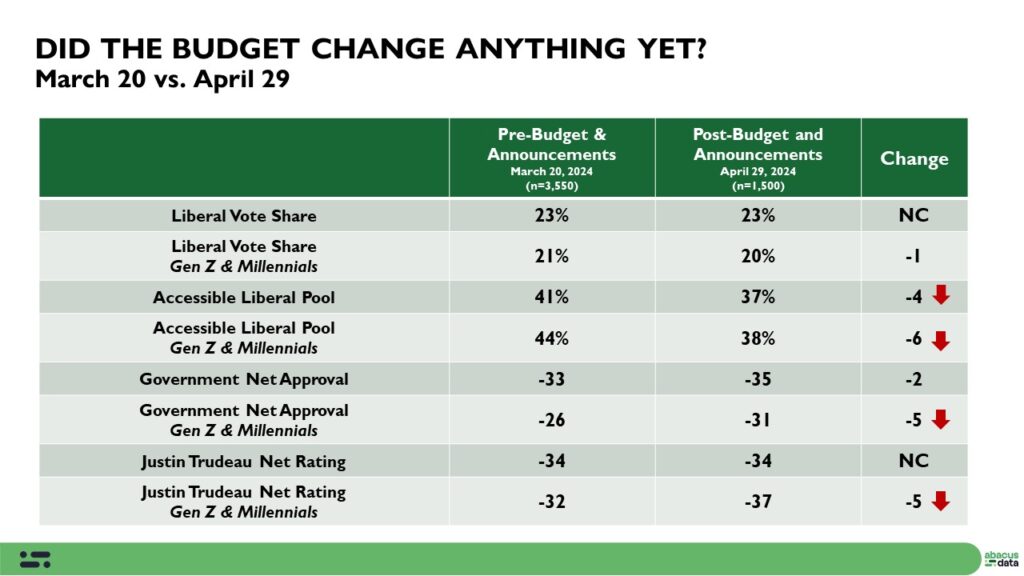
The Upshot
According to Abacus Data CEO David Coletto: “The results from our latest survey clearly illustrate the challenging position the Liberal Party and Prime Minister Justin Trudeau find themselves in following the federal budget. Despite attempts to sway public opinion, there has been no discernible improvement in their poll numbers, with the party stuck in a deep hole not seen since before 2015.
Despite concerted efforts to frame the recent federal budget around generational fairness, aimed at garnering support among younger Canadians, the anticipated shift in sentiment has not materialized (yet?). Our data shows that while younger Canadians who are familiar with the budget did indeed respond more positively compared to their older counterparts, this has not translated into any discernible change in support for the party or its leader among these critical cohorts.
As Trudeau’s approval ratings continue to stagnate, Pierre Poilievre has emerged as a more popular figure, his favorability growing as the Liberal leader’s wanes. This shifting dynamic presents a formidable challenge for the Liberals, who are now grappling with the reality of a deeply entrenched negative perception. The challenge for Trudeau is immense, as reversing these sentiments appears increasingly difficult amidst growing dissatisfaction. The stark contrast in the trajectory of the Liberals compared to the rising Conservatives underscores a significant realignment in Canadian politics, one marked by a major shift in how younger generations view their political choices at the moment.”
Methodology
The survey was conducted with 1,500 Canadian adults from April 25 to 29, 2024. A random sample of panelists were invited to complete the survey from a set of partner panels based on the Lucid exchange platform. These partners are typically double opt-in survey panels, blended to manage out potential skews in the data from a single source.
The margin of error for a comparable probability-based random sample of the same size is +/- 2.6%, 19 times out of 20.
The data were weighted according to census data to ensure that the sample matched Canada’s population according to age, gender, educational attainment, and region. Totals may not add up to 100 due to rounding.
This survey was paid for by Abacus Data Inc.
Abacus Data follows the CRIC Public Opinion Research Standards and Disclosure Requirements that can be found here: https://canadianresearchinsightscouncil.ca/standards/
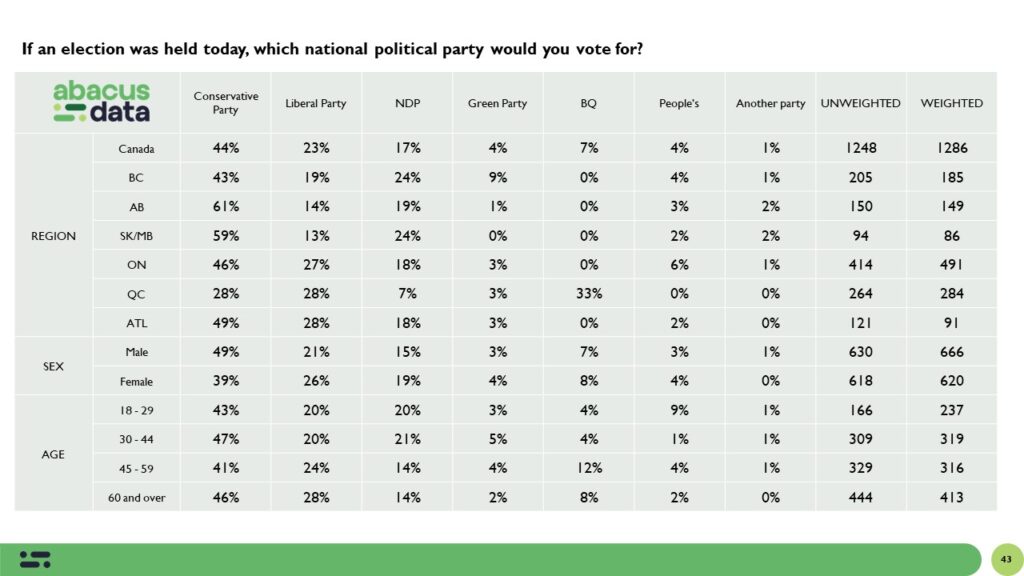
ABOUT ABACUS DATA
We are Canada’s most sought-after, influential, and impactful polling and market research firm. We are hired by many of North America’s most respected and influential brands and organizations.
We use the latest technology, sound science, and deep experience to generate top-flight research-based advice to our clients. We offer global research capacity with a strong focus on customer service, attention to detail, and exceptional value.
And we are growing throughout all parts of Canada and the United States and have capacity for new clients who want high quality research insights with enlightened hospitality.
Our record speaks for itself: we were one of the most accurate pollsters conducting research during the 2021 Canadian election following up on our outstanding record in the 2019, 2015, and 2011 federal elections.
Contact us with any questions.
Find out more about how we can help your organization by downloading our corporate profile and service offering.




